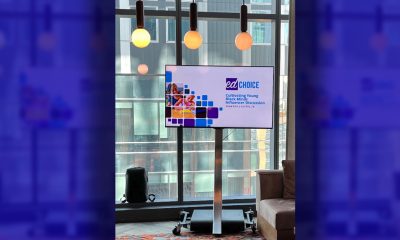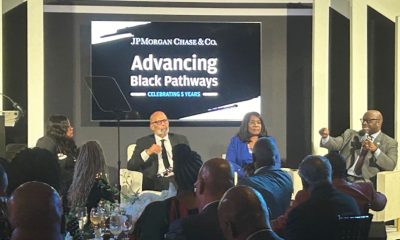Economics
Carl Davis Leads Silicon Valley Black Chamber of Commerce

The Silicon Valley Black Chamber of Commerce (SVBCC) promotes diversity and opportunity for African American and minority businesses. Local businessman Ron McPherson, who served as president for ten years, founded the organization in 1989. The current leader, Carl Davis, Jr. was its first executive director in 1990.
As president of the SVBCC, Davis seeks to increase the number of successful minority businesses, especially African American businesses, in Silicon Valley while developing a pipeline of future entrepreneurs through better education.
“The Silicon Valley Black Chamber of Commerce is more than an organization for just businesses, it’s an integral part of the economic development fiber of our community,” said Davis. “When we speak of economic development we mean more than entrepreneurship, we mean job creation and money flowing within our communities for a sustainable environment.
Membership is open to all business owners, individuals, groups, seniors, youth, and associations that support the organization’s mission,” he said.
Through workshops, training and seminars, the SVBCC provides businesses with resources to start, run and sustain their businesses. Davis also says the SVBCC helps business owners learn about certifications in order to do business with the federal, regional and local governments as a contractor.
“We advocate for African Americans and minority-owned businesses, vendors and contractors to secure lucrative business opportunities and compete on the playing field,” added Davis.
Through their eMobile Solution, Davis says members have the ability to connect B2B and B2C clients and customers that enhance the promotion, advertisement and selling of products and services.
“We are committed to using both traditional and innovative strategies to empower our community and overcome historical business and financial obstacles, such as access to capital, capacity building and getting our share of contracts,” said Davis.
In 2001, the chamber created the Center for Entrepreneurial Development to serve the community through its educational programs and incubator project.
Through Next Gen, the chamber provides business and financial literacy skills to high school students. Some of Next Gen’s participants have visited President Barack Obama and won national honors in entrepreneurship programs like, National Foundation for Teaching Entrepreneurship, NFTE, and Junior Achievement, JA.
Two expanded programs include, “It takes a Village with STEM” and “Intern to Perm.” The programs are designed to engage youth as early as first grade and on to STEM-related projects with professionals in STEM as college age students.
“Being connected through teaching, mentoring or just connecting these students is the way the dropout rate for youth of color will definitely decline.” said Davis.
The chamber has also worked to establish partnerships beyond finance and business by providing outreach, education and enrollment for Covered California.
“Economic health is important but physical health is essential and through our networks, we have the ability to reach the community,” said Davis.
SVBCC’s annual events include Blacks N Business, Black N Technology and the Silicon Valley Black Youth Hack-a-Thon.
For more information, visit www.blackchamber.com
Business
Black Business Summit Focuses on Equity, Access and Data
The California African American Chamber of Commerce hosted its second annual “State of the California African American Economy Summit,” with the aim of bolstering Black economic influence through education and fellowship. Held Jan. 24 to Jan. 25 at the Westin Los Angeles Airport Hotel, the convention brought together some of the most influential Black business leaders, policy makers and economic thinkers in the state. The discussions focused on a wide range of economic topics pertinent to California’s African American business community, including policy, government contracts, and equity, and more.

By Solomon O. Smith, California Black Media
The California African American Chamber of Commerce hosted its second annual “State of the California African American Economy Summit,” with the aim of bolstering Black economic influence through education and fellowship.
Held Jan. 24 to Jan. 25 at the Westin Los Angeles Airport Hotel, the convention brought together some of the most influential Black business leaders, policy makers and economic thinkers in the state. The discussions focused on a wide range of economic topics pertinent to California’s African American business community, including policy, government contracts, and equity, and more.
Toks Omishakin, Secretary of the California State Transportation Agency (CALSTA) was a guest at the event. He told attendees about his department’s efforts to increase access for Black business owners.
“One thing I’m taking away from this for sure is we’re going to have to do a better job of connecting through your chambers of all these opportunities of billions of dollars that are coming down the pike. I’m honestly disappointed that people don’t know, so we’ll do better,” said Omishakin.
Lueathel Seawood, the president of the African American Chamber of Commerce of San Joaquin County, expressed frustration with obtaining federal contracts for small businesses, and completing the process. She observed that once a small business was certified as DBE, a Disadvantaged Business Enterprises, there was little help getting to the next step.
Omishakin admitted there is more work to be done to help them complete the process and include them in upcoming projects. However, the high-speed rail system expansion by the California High-Speed Rail Authority has set a goal of 30% participation from small businesses — only 10 percent is set aside for DBE.
The importance of Diversity, Equity and Inclusion (DEI) in economics was reinforced during the “State of the California Economy” talk led by author and economist Julianne Malveaux, and Anthony Asadullah Samad, Executive Director of the Mervyn Dymally African American Political and Economic Institute (MDAAPEI) at California State University, Dominguez Hills.
Assaults on DEI disproportionately affect women of color and Black women, according to Malveaux. When asked what role the loss of DEI might serve in economics, she suggested a more sinister purpose.
“The genesis of all this is anti-blackness. So, your question about how this fits into the economy is economic exclusion, that essentially has been promoted as public policy,” said Malveaux.
The most anticipated speaker at the event was Janice Bryant Howroyd known affectionately to her peers as “JBH.” She is one of the first Black women to run and own a multi-billion-dollar company. Her company ActOne Group, is one of the largest, and most recognized, hiring, staffing and human resources firms in the world. She is the author of “Acting Up” and has a profile on Forbes.
Chairman of the board of directors of the California African American Chamber of Commerce, Timothy Alan Simon, a lawyer and the first Black Appointments Secretary in the Office of the Governor of California, moderated. They discussed the state of Black entrepreneurship in the country and Howroyd gave advice to other business owners.
“We look to inspire and educate,” said Howroyd. “Inspiration is great but when I’ve got people’s attention, I want to teach them something.”
Activism
Oakland Post: Week of April 17 – 23, 2024
The printed Weekly Edition of the Oakland Post: Week of April 17 – 23, 2024

To enlarge your view of this issue, use the slider, magnifying glass icon or full page icon in the lower right corner of the browser window. ![]()
Activism
Oakland Post: Week of April 10 – 16, 2024
The printed Weekly Edition of the Oakland Post: Week of April 10 – 16, 2024

To enlarge your view of this issue, use the slider, magnifying glass icon or full page icon in the lower right corner of the browser window. ![]()
-

 Activism4 weeks ago
Activism4 weeks agoOakland Post: Week of March 27 – April 2, 2024
-

 #NNPA BlackPress4 weeks ago
#NNPA BlackPress4 weeks agoCOMMENTARY: D.C. Crime Bill Fails to Address Root Causes of Violence and Incarceration
-

 #NNPA BlackPress4 weeks ago
#NNPA BlackPress4 weeks agoFrom Raids to Revelations: The Dark Turn in Sean ‘Diddy’ Combs’ Saga
-

 #NNPA BlackPress4 weeks ago
#NNPA BlackPress4 weeks agoCOMMENTARY: Lady Day and The Lights!
-

 #NNPA BlackPress4 weeks ago
#NNPA BlackPress4 weeks agoMayor, City Council President React to May 31 Closing of Birmingham-Southern College
-

 #NNPA BlackPress4 weeks ago
#NNPA BlackPress4 weeks agoBaltimore Key Bridge Catastrophe: A City’s Heartbreak and a Nation’s Alarm
-

 #NNPA BlackPress4 weeks ago
#NNPA BlackPress4 weeks agoBaltimore’s Key Bridge Struck by Ship, Collapses into Water
-

 #NNPA BlackPress4 weeks ago
#NNPA BlackPress4 weeks agoBeloved Actor and Activist Louis Cameron Gossett Jr. Dies at 87




















































